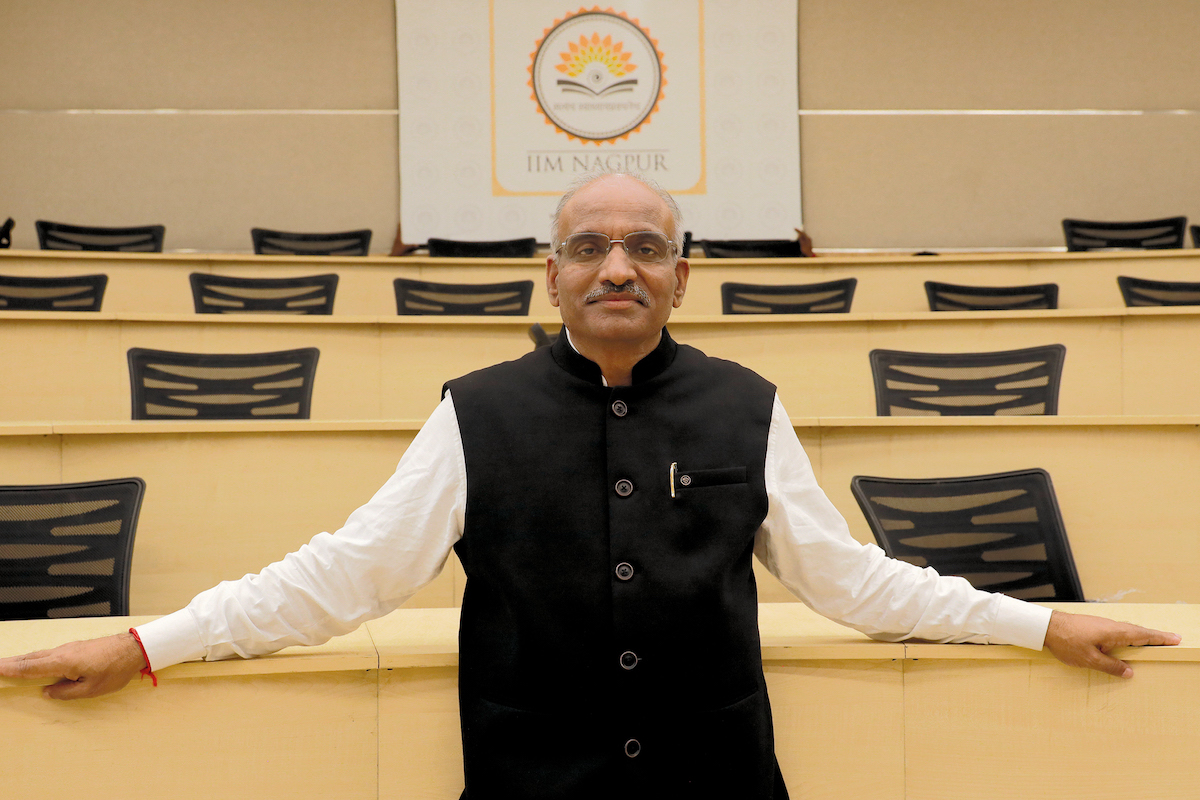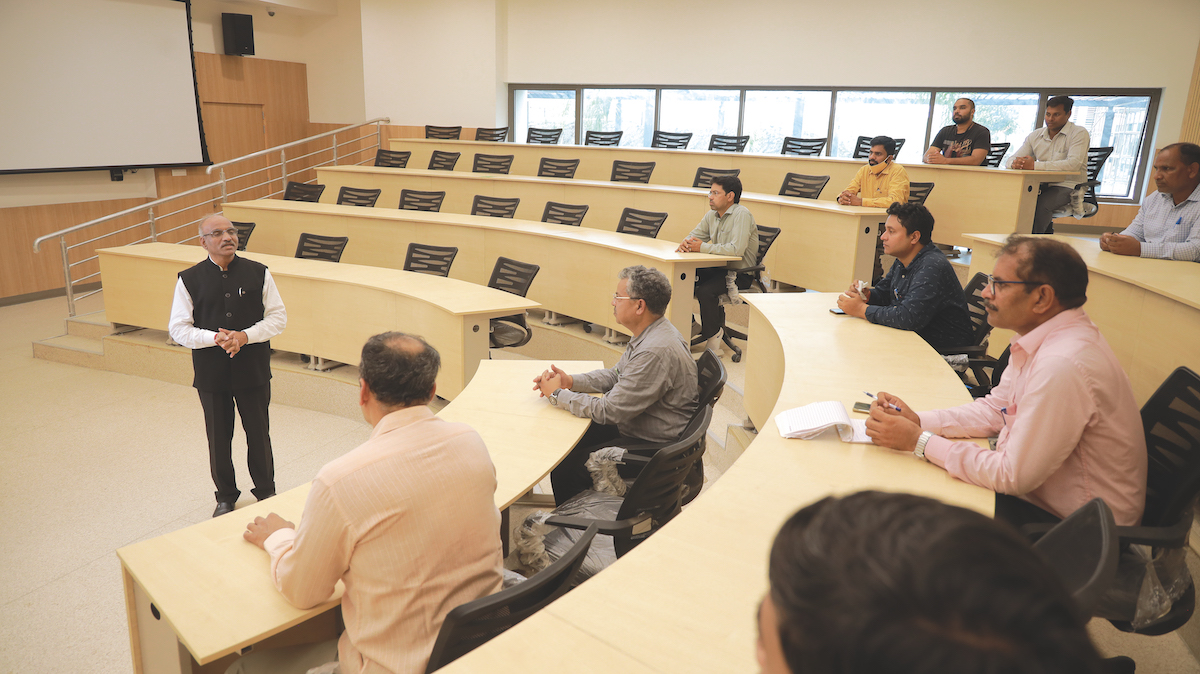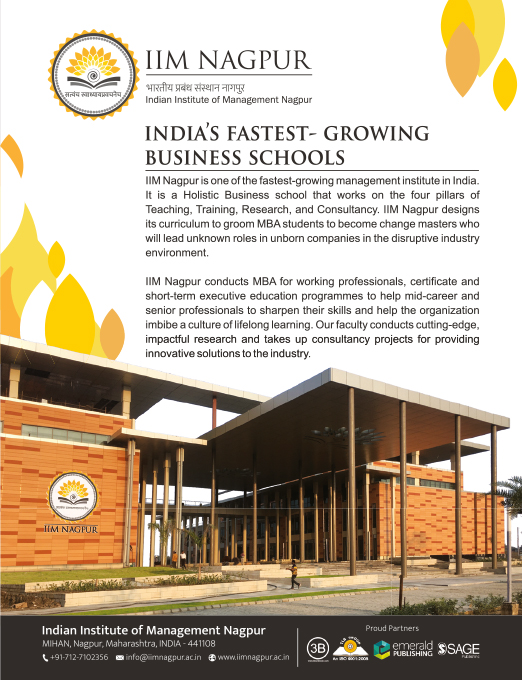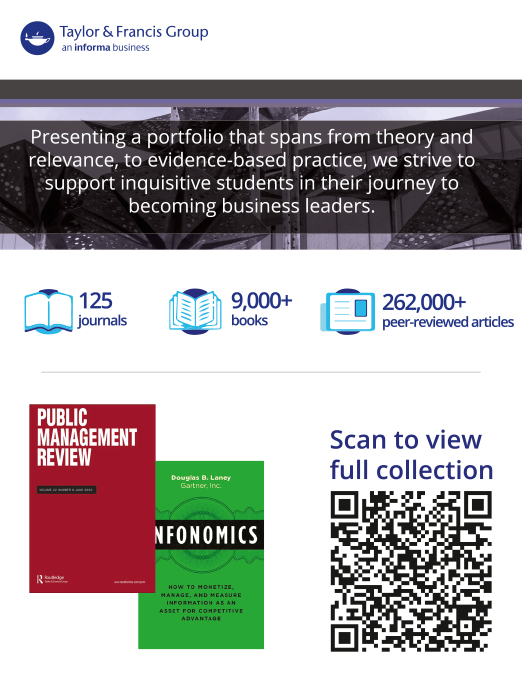As India’s economy bounds ahead, one of its critical enablers is education. Technology, international cooperation and global movement of work skills mean the nation must provide a first-rate higher education for its populace to make its way in the world. It is doing that by investing heavily in new institutions and refurbishing others to provide the infrastructure and academic resources needed for its long-term future.

The Indian Institute of Management (IIM) Nagpur was established in 2015, and its first program commenced later that year. It is a member of the Association to Advance Collegiate Schools of Business. IIM Nagpur’s Director, Dr Bhimaraya Metri, came to the organisation in 2020 after a distinguished career as an academic, teacher, researcher, institution builder and administrator.
He has led numerous premier management institutes, including IIM Tiruchirappalli which, under his directorship, was classified as one of the leading business schools in India. He has also contributed as Dean at the L&T Institute of Project Management, IMI New Delhi and MDI Gurgaon, and led research programs at BITS Pilani. He is a renowned expert in project management and infrastructure, quality and supply chain management.
As if he isn’t already busy enough, he is also serving as Chair of, among others, AIMA Board of Studies, the All India Board of Management Studies, the Management and Systems Division Council and the HR and Innovation sectional committee of the Bureau of Indian Standards.
Apart from being Chancellor’s Nominee and Visitor’s Nominee, he’s also convener and member of the selection committee of Central University Vice Chancellors, as well as member of the Indian National Commission for Cooperation with UNESCO in addition to serving on the panel of experts for Mentoring the Institutes of Eminence. The role of Director at IIM Nagpur caught his fancy for three reasons, he tells The CEO Magazine.
The challenge for business schools is that the right balance must be achieved between theory and practice.
“When I decided to move to IIM Nagpur, I saw three opportunities. Firstly, it is a startup, just a few years old. It has no legacy and constraints, so it has both scale and scope for opportunities in MBA and PhD programs, executive education and, most importantly, entrepreneurship development, particularly for micro, small and medium enterprises, the social sector and agriculture,” he explains. These fit his own personal background, he says. “I am a first-generation educator. My father was a farmer from a very small, remote village in a drought area of the Sangli district of Maharashtra. However, I learned to live comfortably with being uncomfortable and how to level success through adversity.”
Plans afoot
Bhimaraya has ambitious plans for the institute, and has wasted no time in pushing his agenda forward. His vision is of knowledge creation, dissemination and application, which he says should occur in any great business school as a holistic education program. In the short-term, he has planned rapid expansion of the organisation by launching a variety of online postgraduate certificate programs sought by industries.

Cybersecurity and blockchain subjects will play important roles in every business, he believes, and IIM Nagpur is the first institution in the country to offer one-year postgraduate certificate programs in these areas with the arrangement of international strategic partner business schools.
“We have recently launched an MBA for working professionals in the Nagpur main campus to sharpen their skills, and we also have planned a PhD program for senior working professionals and practitioners. “To cater to the skilling, reskilling and upskilling needs of the industry belt in western Maharashtra, the Pune campus was established in September 2021 to start MBAs for working professionals in early 2022. By 2023 we are planning to launch the MBA in data science and management from that campus. We also plan to open IIM Nagpur Hyderabad campus in the academic year 2022–23.”
What’s more, IIM Nagpur is looking further afield to expand its reach: it is planning a new campus in Singapore in the next two to three years to establish a firm base in South-East Asia.
Challenges ahead
While Bhimaraya has already made his mark, he sees major challenges ahead – which he is excited about taking on, to raise the institute to the next orbit. “I can see four challenges,” he explains.
“One, attracting the best academic talent. In business school, two things are important: academically qualified and professionally qualified faculties. To teach the practitioner-oriented courses, we need seasoned professionals to teach banking, advertising management, sales and distribution management, and project and supply chain management. In such courses, practitioners can help make the students understand on-ground realities.
“Our second challenge is strategic partnerships with leading global business schools. Recently, we have built seven strategic partnerships globally. We have established dual-degree programs with the University of Lille, France, where their students can come and do the dual degree with us, and our students can go there for the same.
“Third is establishing strong industry connections. The challenge for business schools is that the right balance must be achieved between theory and practice. IIM Nagpur has established leadership in the area of strong industry connectivity. The fourth – and the most important, particularly for India – is restructuring the institute program as per the new National Education Policy (NEP 2020), which has introduced interdisciplinary and multidisciplinary concepts.”
Bhimaraya wants IIM Nagpur to be a leader in implementing NEP 2020 by establishing schools of economics, humanities, arts and social sciences, leadership and behavioural science, decision sciences, operations management, information systems and a school of strategy and entrepreneurship. Every school will offer one-year master degree programs in their specialty.
“All the schools will together support our classic MBA program. I visualise NEP 2020 being implemented in this fashion, and hopefully many other institutions may follow it,” he says.
“Success in the organisation is measured in overall vertical and horizontal expansion of the institution. The holistic business school is successful if there is growth in five key areas: intellectual capital and research, growth in MBA and PhD programs, growth in executive education and growth in consultancy, and most importantly, the participation of higher education in the nationbuilding activities of the government.”
IIM Nagpur has several distinct advantages over other institutions because of its location in the heart of India, Bhimaraya says, as well as its connectedness through airports, highways and rail lines. Nagpur is also the logistics capital of India, with the institute located in the heart of the IT and other industries in the multi-product special economic zone. It’s not enough to build competency, he adds; capability is essential.
“We have excellent opportunities to put industry leaders into classrooms. IIM Nagpur focuses on new generations. When I joined, I started with the top industry leaders in the country in partnerships for the revision of the curriculum, and we added new-generation skills. We are bringing a focus on phenomena-based learning, project-based learning and also global immersion programs.” Bhimaraya’s vision of a new education paradigm in India is already reality.
Proudly supported by:




